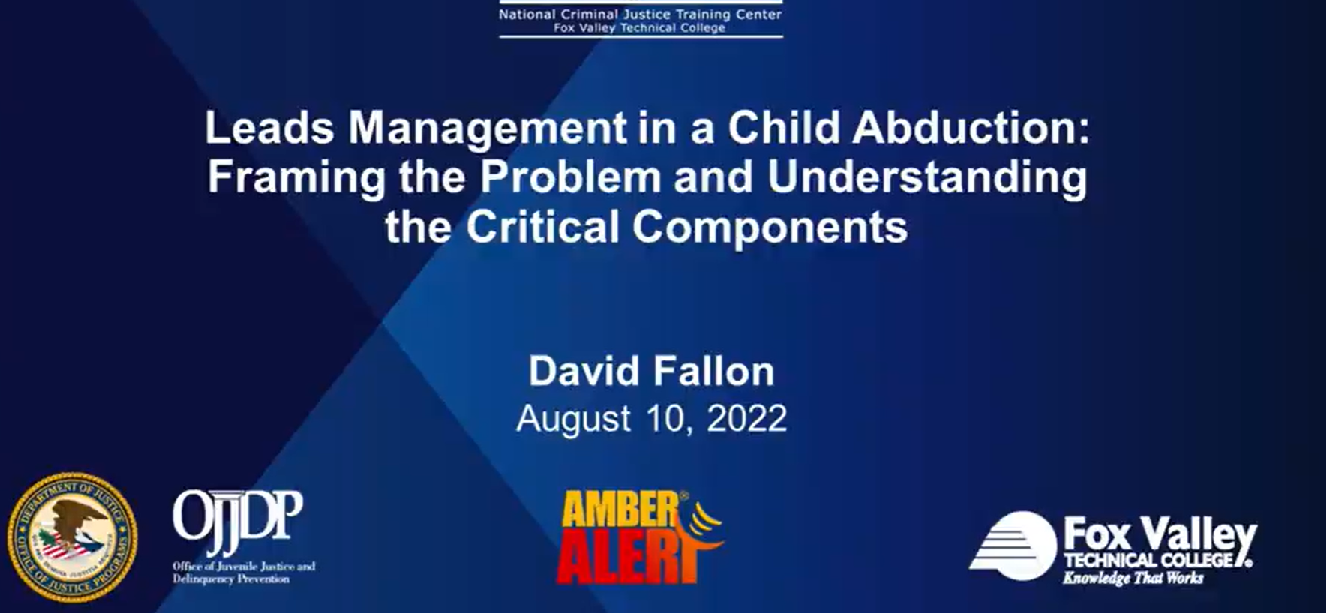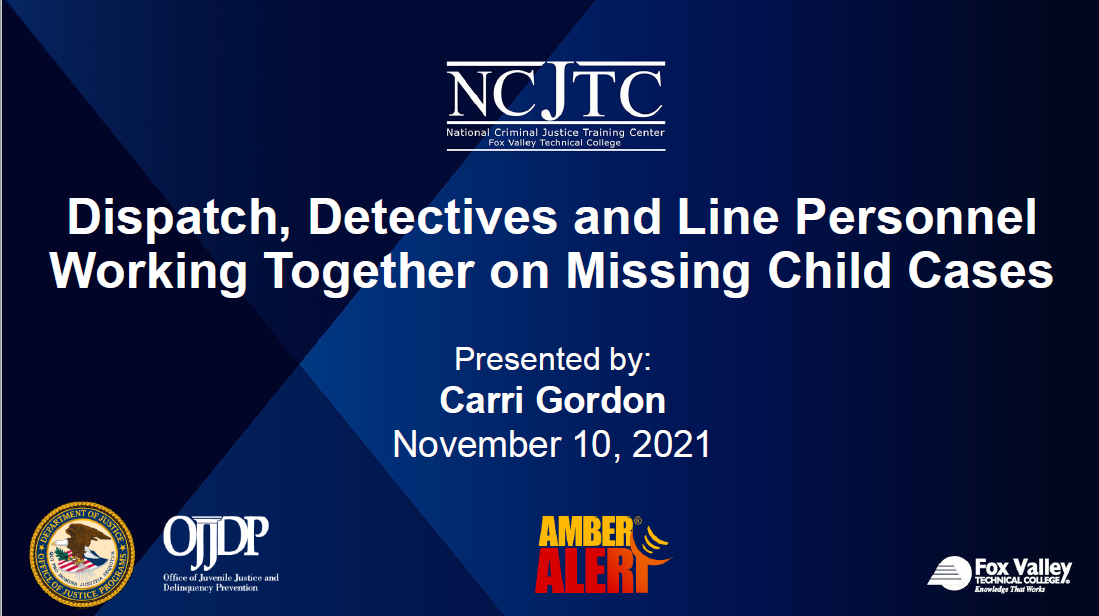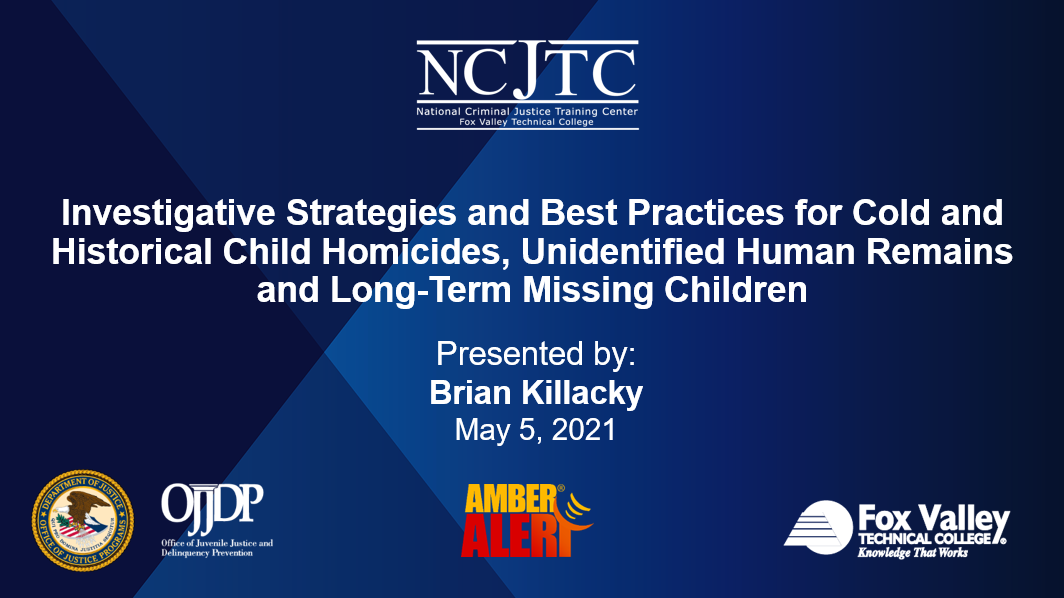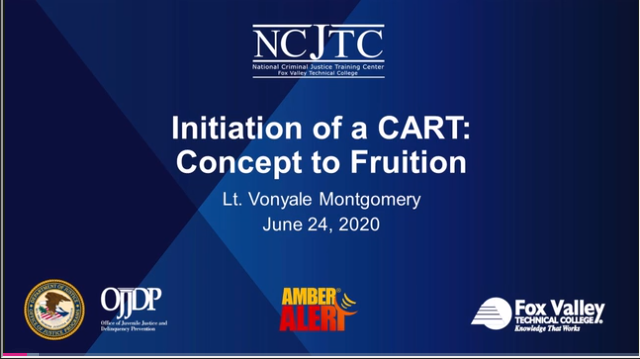Training Webinars
On Demand: View Recorded AMBER Alert Webinars
Missing Children of Color: Gauging our Response to Endangered Missing Black Children
In this first webinar in the Missing Children of Color Series, you will learn about research related to the law enforcement recovery rates and the societal response to missing black children. Examine the connection between being an endangered missing child and child sex trafficking, along with other exploitive situations missing children find themselves in. Learn about actionable steps law enforcement and community members can take to support efforts to recover all endangered missing children.
Advocacy for Child Sex Trafficking (CST) Victims – Serving the Vulnerable
Child Sex Trafficking victims are a population of missing children that are in desperate need of system-based advocacy. Hear from CST advocacy experts who provide services to CST victims. One is a Law Enforcement based advocate who works alongside law enforcement and can also provide an NGO perspective; the second is a Child Protection Services supervisor with a strong background in fostering advocacy from within the Child Protection system. Listen to their hands-on experiences with CST victims and their promising practices for providing much needed services to these vulnerable victims.
Understanding When and Why AMBER Alerts are Issued and Not Issued
Discover the history of the AMBER Alert and the roles and responsibilities of AMBER Alert Coordinators in each state. Examine the guidelines for issuing an Alert and comprehend why alerts are and sometimes are not issued. Explore tools and resources which can improve and support the AMBER Alert process.
When the Family is Involved: Investigation of Family Member Abductions and False Allegations of Child Abduction
Abductions involving family members may be one of two scenarios; a family member abducts the child, or the family member is involved in the death of the child and then falsely reports the child as missing. Compare and contrast specific characteristics of different types of family member involved child abductions. Identify crucial initial steps in a Family Member Abduction which can aid in quick recovery of the child. Delve into the False Report of Child Abduction by a family member. Identifying patterns and response recommendations to assist in discerning a false report, then the investigative steps to thoroughly investigate family members and either focus investigative efforts upon them or eliminate them quickly. Examine several case studies of false reports and identify risk factors that indicate possible false reports.
A CPS Perspective: Missing and Trafficked, Detecting Child Sex Trafficking with No Disclosure
Child Protective Services (CPS) case workers encounter child sex trafficking victims during and following missing events in which extensive exploitation is occurring or has occurred. Examine when CPS has jurisdiction and a duty to investigate trafficking cases, along with why and how children go missing from care. Identify vulnerabilities and recognize factors which indicate sex trafficking. Often these recovered missing or abducted children do not disclose their exploitation when recovered or encountered by CPS. Analyze the bond the victim has with the trafficker and discover why disclosing is difficult for children. Identify approaches to protect children when you suspect trafficking but have no disclosure from the victim. Lastly, develop opportunities to collaborate with law enforcement and other professionals to identify and support CST victims.
Southern Border Initiative (SBI) Cross Border Child Abductions
Explore the partnership and collaboration between the United States and Mexico in combatting child abductions. Examine takeaway information garnered from an SBI meeting with subject matter experts regarding cross border abductions. Identify current trends and motivators in abductions, recognize legal complexities of cross border crimes, and examine a cross border case study which demonstrates the vital collaborative effort necessary for the safe return of children to their respective countries.
Search and Canvass: Legal Issues in Child Abductions
Child abductions present legal issues which often must be resolved quickly. Explore common legal challenges which arise related to search and seizure in the cases. Gain critical information to make key legal decisions when a child has been abducted and their recovery may depend on it. Examine Fourth Amendment parameters for cell phones, GPS tracking, and scent dogs in the search for abducted children.
Resiliency and Wellness for Public Safety Professionals
Exposure to missing and exploited children's trauma can take a toll on the team of criminal justice professionals it takes to recover and treat the child, as well as investigate the case and prosecute the suspects. Examine how this exposure can impact your mental wellness and discover ways to recognize the signs of mental distress for yourself and your teammates. Identify ways to implement self-care and understand when you should seek out care. Explore the impact of trauma on child victims and identify best approaches to supporting them.
Child Sex Trafficking Investigations: 5 Things to Strengthen Law Enforcement and Advocacy Partnerships
Investigating a child sex trafficking case while recognizing the need for advocacy throughout the process can be a challenge both for law enforcement and for advocates. Explore the different perspectives each bring to their contacts with victims. Identify 5 core values of partnership which will enable you to have a successful and productive team as you serve the most vulnerable of victims. Examine a victim’s perspective of a law enforcement-led advocacy team and hear how it impacted her life.
AMBER Alert Essentials for First Responders
Law Enforcement Officers and Telecommunicators are AMBER Alert First Responders during the critical initial stage of a child abduction. This webinar will review the criteria for an AMBER Alert and identify tools and resources which enhance first responder capabilities in cases of endangered missing and abducted children, with detailed considerations for those where AMBER Alerts are issued.
Leads Management in a Child Abduction: Framing the Problem and Understanding the Critical Components
One of the most important and pivotal components of a child abduction response is the ability to effectively manage information during an incident. Learn the importance of using a leads management system and provide guidance regarding the implementation, organization, and dissemination of leads using various systems.
AMBER Alert Essentials for Community Members
AMBER Alert Essentials for Community Members will enable members of the public to recognize the history and essential components of the AMBER Alert Program. The criteria for an AMBER Alert will be examined as well as how to support law enforcement efforts during an AMBER Alert activation.
Dispatch, Detectives and Line Personnel Working Together on Missing Child Cases
How important it is that everyone working these cases understands roles and responsibilities? Discuss having a plan in place, ahead of time, to outline what will happen and who will do what -- and why that's important. Time is the enemy in these cases; a seamless initial intake with a clear understanding of what is needed will ultimately make the difference when seconds matter.
Cultural Considerations when Working within Indian Country – Part 2
Through this second webinar of a 2-part webinar series on "Cultural Considerations when Working within Indian Country," you will gain a better understanding of tribal jurisdictions and its impact on investigations in Indian Country. Examine the history of tribal communities' and how cultural values can impact interactions when working with victims of exploitation. Review best practices to recognize, identify and assist high-risk children living on tribal lands.
Crucial Digital Follow-Up and Recovery Techniques in Missing/Runaway & Endangered Missing Children Cases
Today when a child or adult goes missing, there are many digital avenues of follow-up that are necessary in a timely recovery. During this webinar, we will address follow-up items that are often time sensitive and crucial if the case becomes a long-term investigation. Learn how to follow-up on Internet activity, social media accounts, device usage, application data, important “usage” on cell phones or tablets and more.
Investigative Strategies and Best Practices for Cold and Historical Child Homicides, Unidentified Human Remains and Long-Term Missing Children
Examine effective strategies and best practices for the reinvestigation of cold and historical child homicides, unidentified human remains and long-term missing children investigations when there is no body. This webinar illustrates how children can be the perfect victim, and as such, how their cases can become historical and unresolved. Investigative strategies for establishing that a crime has been committed, identifying those responsible for the crime, and for proving or disproving facts and circumstances in the original unresolved investigation will be discussed. Learn how an MDT response can result in a successful resolution.
Cultural Considerations When Working Within Indian Country – Part 1
When working on missing and exploited children’s cases within Indian Country, it is important to value the differences, understand and adapt to the culture, and recognize that various dynamics exist. Through this webinar, you will obtain a better understanding of the tribal community and its system of shared values, beliefs, and rituals that are learned and passed on through generations. You will also gather best practices and examples to reduce barriers and increase trust when working on missing and exploited children’s cases on tribal lands.
AMBER Alert in Indian Country 101 – Community Response
AMBER Alerts are activated in the most serious child-abduction cases. The goal of an AMBER Alert is to instantly galvanize the community to assist in the search for and safe recovery of a missing child. These alerts are broadcast through radio, TV, road signs, cellphones, and other data-enabled devices. During this webinar, tribal community members consider law enforcement's response to missing and abducted children, and when an AMBER Alert is an effective tool. The importance of bridging the gap between law enforcement and the community is discussed, as are ways community members can assist during and before a missing or abducted child situation.
Child Abduction and Exploitation Investigations During Disasters and Emergencies
Improve response and recovery for endangered missing, child abduction and exploitation investigations during disasters and emergencies. Through case studies, review past disasters to explore and develop response strategies for protecting children during periods of restricted movement, social distancing or shelter in place.
Initiation of a Child Abduction Response Team (CART): Concept to Fruition
Explore how to take the CART concept and bring it to life in your department. Is there a standard template for gaining acceptance from stakeholders? Does my department need CART? Is it feasible? What if my CART doesn’t look like other programs? This webinar will address these questions and provide clarity on how to form an effective CART tailored to the specific needs of the agency/jurisdiction/region it serves.
Identifying and Utilizing CART Resources for an Effective Collaborative Response
Examine resources that are crucial to implement during a missing child incident. Hear about the importance of accumulating these resources before a call comes in for a missing or abducted child. The successful recovery of a missing or abducted child is dependent on organization and team work. Understand at the end of this webinar, how important a Child Abduction Response Team is in these high priority, time sensitive cases.
AMBER Alert Best Practices - Law Enforcement Field Guide
The AMBER Alert Best Practices – Law Enforcement Field Guide is a companion to the AMBER Alert Best Practices Guide and is aimed at law enforcement agencies and first responders. It is designed to provide administrators with a document on what to expect in the event of an endangered missing or abducted child investigation, as well as provide their personnel with a reference manual to help jump start an effective response and investigation. The webinar focuses on raising awareness of areas that are consistently shown to be relevant and have an operational impact in these types of cases as well as how the guide can assist.
Sex Trafficking: Current Trends in Technology
This webinar provides law enforcement and service providers with information on how technology (cell phones, phone chat lines, social networking sites, and internet advertisements) are used to seduce, lure, and control child victims of sex trafficking. The presenter discusses how to develop successful investigative techniques to proactively identify and locate child victims and corroborate the technology facilitated commercial sexual exploitation investigation. Case studies are used to facilitate the discussion. Pitfalls and challenges to these investigations are also discussed to help agencies identify them within their strategies and approaches to combating this crime.
Search and Canvass in Missing and Abducted Children Cases
Explore the importance of an immediate search and canvass when a child goes missing. Statistics show that the quicker responders can organize a search and canvass, the more likely that the child will be recovered. In addition, this webinar will examine the most effective search and canvass strategies. Demonstrate examples of actual cases, which will compare and contrast an effective versus a flawed response where search and canvass was utilized.
Prosecuting Child Sex Trafficking Cases
Learn how a team approach to investigations allows all members of a multidisciplinary team to work together to investigate cases involving child sex trafficking, and to gather the evidence necessary to make a successful case. The presenter will discuss charging decisions, trial preparation, accomplice testimony, defense strategies, and witness preparation.
Forced Criminality of CST Cases
Criminal records of sex trafficking victims are known barriers to exiting sex trafficking situations. The link between committing crime while being a victim of sex trafficking, called forced criminality, has received little research attention. One aspect of forced criminality in sex trafficking situations includes ‘trick rolls’ which are the robberies of sex buyers. With the purpose of exploring forced criminality, this study examined 467 trick roll cases which are robberies conducted in a prostitution situation perpetrated by the sex seller, during one year in Las Vegas, Nevada. Using crime databases and working knowledge of the LVMPD Vice and Sex Trafficking Investigations Unit, 36 percent of the identified suspects in the trick roll cases were found to be known victims of sex trafficking. Trick roll cases involving sex trafficking victims were found to be more likely to involve multiple suspects (including their sex trafficker), begin at a bar/club or casino floor, involve the theft of more valuable items, more likely involve a weapon, and more likely to involve the injury of the sex buyer.
The Importance of CART Training: A Family Perspective
Gain a family's perspective on the importance of Child Abduction Response Team training. David Smither will share his experience of losing his own sister to a serial offender, in a small town that was unprepared to deal with such a catastrophe. Having witnessed first-hand his own community’s lack of preparedness, and subsequently growing up in close proximity to missing children’s cases through his family’s nonprofit, the Laura Recovery Center Foundation, David has a unique perspective on the importance of disaster preparedness. This presentation will combine a high level introduction to CART (and related training resources) with a powerful personal testimony of the impact of the abduction of a child on a family’s life.
Building a Sex Trafficking Case Without the Victim
Prosecuting sex trafficking of minor cases is difficult, in part because victims are unstable. Join us for this webinar to discuss building an investigation that allows the prosecutor to go to trial, even if the victim is unable to testify.
Prosecuting Sex Traffickers: Trial Preparation
This webinar is designed to assist prosecutors and investigators who are preparing child sex trafficking cases for trial. We will discuss preparing a case for trial, charging decisions, expert witnesses, and defense strategies. Trafficking cases require thorough case preparation of complex evidence. Analyzing potential charges early in the case allows for the collection of evidence and the consideration of what witnesses are required. Expert witnesses are necessary to help the jury understand both pimp subculture and victim issues. Anticipating defense strategies helps prosecutors stay focused on their case to achieve a successful prosecution.
Prosecuting Sex Traffickers: Strategies for Witnesses in Child Sex Trafficking and Exploitation Cases
During this webinar, you will learn how to prepare child sex trafficking cases for trial and how to effectively work with witnesses, including issues of delayed disclosure and complicity. Working with victims, witnesses, and accomplices requires an understanding of the recovery process and bridging gaps with people who have little trust for law enforcement or the prosecution process.
Child Abduction Response Team (CART) Overview
Thinking of starting a Child Abduction Response Team (CART) in your jurisdiction? Learn how building a CART can assist in the search and recovery of an abducted or endangered child. During this webinar, you will learn about the guidelines for developing, implementing, and sustaining a CART program within your community, and examine the CART certification process for agencies and CART programs pursuing formal certification.
Partners and Resources During an AMBER Alert
When activating an AMBER Alert, the investigating agency relies upon their partners and stakeholders to share the abducted child's information to the public and assist in locating the child. During this webinar, you will learn about the multiple partners, stakeholder groups, and resources available to law enforcement during the AMBER Alert activation process and how they may be able to assist.
































